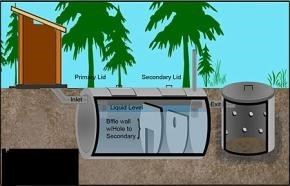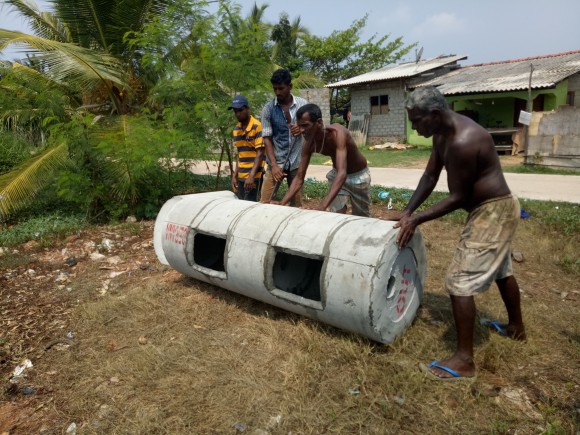In May 2016, severe floods hit Sri Lanka, causing spilling of toilet waste in the streets of urban areas, especially in Colombo and Gampaha districts, on the west side of the island, which were particularly affected owing to the overflowing of the Kelani river that goes through these areas.
In response, ACTED, with support from UNICEF, installed septic tanks in over 400 affected households to enable safe excreta disposal.
Septic tanks for improved sanitation
After the floods, sanitary conditions in beneficiaries’ houses drastically deteriorated, thus leading to further complications. One family explained that despite their limited income, they had resigned themselves to hiring a babysitter while at work to look after their two kids who used to play near the damaged pit, thereby endangering their health and safety. Others did not even have toilets and had to resort to using their neighbours’ toilets or to go in the open. In addition, as some of the beneficiaries live in wetlands areas but did not have sufficient resources to properly dry out their backyards, they had resorted to dramatic measures such as filling their backyards with piles of plastic residues, causing severe damage to the local environment. For those families, the new septic tanks came as a great relief.

“My toilet pit was damaged and waste was leaking in my backyard”, explained Shanthi, a beneficiary from Kelaniya, on the outskirts of Colombo.
Giving us a septic tank has been very helpful. We did not even dare to walk around that area, but we live in a very small plot of land, so after installing this septic tank system, we can use this area again
Mobilizing communities for mitigated sanitary and environmental impact of future floods
ACTED has been working hand in hand with the beneficiary communities in an effort to engage communities in the project, involving village workers in the installation of the septic tanks. As neighbours helped each other in installing their tanks and building new toilets, this community involvement has been very successful in bolstering a strong sense of community and solidarity within beneficiary villages, and in developing a sense of ownership of the project.

Raising awareness on the importance of good hygiene and sanitation
Yet, the mere installation of septic tanks is not sufficient to reduce the scale of waterborne diseases among the population. Therefore, ACTED is conducting an awareness campaign to help beneficiaries understand not only the utility of the septic tanks, but also the importance of basic sanitation and hygiene practices. For this purpose, door-to-door visits are being organised to discuss the importance of a septic tank and its maintenance procedure. In addition to this, group discussions are also conducted with beneficiaries to promote and encourage good hygiene and sanitation practices such as washing hands, brushing teeth, and using clean water for washing vegetables. Disaster risk management practices, such as how to react when floods happen, are also discussed with the beneficiaries.